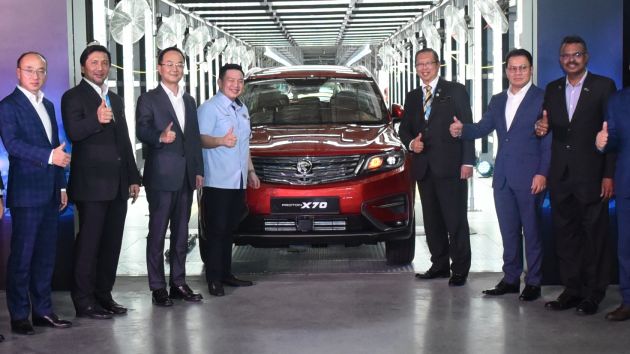
Proton X70 CKD 7-speed wet DCT: more efficient than VW DSGs, >350k km lifetime, meets Volvo standards
by Jonathan LeeProton has recently confirmed that the locally-assembled 2020 X70 will come with a seven-speed dual-clutch transmission, and ahead of its impending launch, the national carmaker brought a select group of media to Ningbo, Zhejiang in China to learn more about the new gearbox.
The wet clutch unit, developed by Geely and Volvo, is being built in Geely’s Chunxiao and Changing plants in Zhejiang province, and it is currently found in variants of the Volvo XC40 and a range of Lynk & Co and Geely models that use the new 1.5 litre turbocharged three-cylinder engine. Some Geely models, like the Boyue the X70 is based on, also get the DCT with the existing 1.8 litre turbo four-pot mill.
In those models, it replaces the six-speed automatic from the Geely-owned Australian gearbox manufacturer Drivetrain Systems International (DSI). In fact, Geely no longer uses gearboxes from DSI, as the six-speed auto offered on the Boyue Pro – mated, confusingly, to the 1.5 litre engine – is sourced from Aisin.
Back to the DCT, which is said to be of roughly the same size as the torque converter auto and weighs less, at just 75 kg. The gearbox comes with a BMW-style shift-by-wire electronic gearlever and paddle shifters, and can shift gears in as little as 0.3 seconds and has a maximum torque rating of 330 Nm. This frees up an extra 15 Nm from the 1.8 litre engine, bringing the total up to 300 Nm. Power remains the same at 181 hp.

Geely claims the DCT provides class-leading efficiency, and it says it actually benchmarked Volkswagen’s dry clutch DSGs (which provide lower driveline losses than Wolfsburg’s wet clutch units) here, with an overall efficiency figure of 94.6% and a maximum figure of 97%.
The latter number is close to a good old-fashioned manual gearbox, and it enables the Chinese-market Boyue to achieve a claimed fuel consumption figure of 7.5 litres per 100 km with the 1.8 litre engine and front-wheel drive – down from the 7.8 litres per 100 km the outgoing six-speeder is capable of mustering. Geely says the gearbox is also more efficient than Aisin’s eight- (88%) and six-speed (89%) autos.
But aside from being efficiency champions, VW’s dry clutch DSGs have also been beset with reliability issues, something Geely is confident it’s able to avoid. Apart from the inherently more robust nature of wet clutches, the company says its DCT conforms to Volvo’s stricter durability requirements, designed for a service life of more than 350,000 km – significantly higher than the industry standard of 240,000 km.

The company has also conducted numerous tests in extreme weather conditions, with hot weather tests in Turpan, China, Alice Springs, Australia and South Africa, plus cold weather tests in Jokkmokk and Colmis in Sweden and Heihe and Yakeshi in China. High altitude tests at the Kunlun Mountain and the Alps, wet weather tests in Hainan and city driving tests in Chongqing, Shanghai, Gothenburg and Stockholm have also taken place, and all in all, the gearbox has racked up over nine million kilometres in testing.
Further improving reliability and efficiency is the use of proprietary low-viscosity transmission fluid – particularly important as DCTs require a different formulation compared to traditional automatic transmission fluid. While Proton has yet to provide specific figures, it did say the service intervals are comparable to the regular automatic, and in fact the fluid is cheaper than the ATF it uses for the CBU imported X70.
Production units of the 2020 X70 are rolling out of Tanjung Malim as we speak, so the launch will happen sooner rather than later. We had a brief test drive of a Geely Boyue Pro in China with the same engine and gearbox combination, and you will be able to read about it shortly.